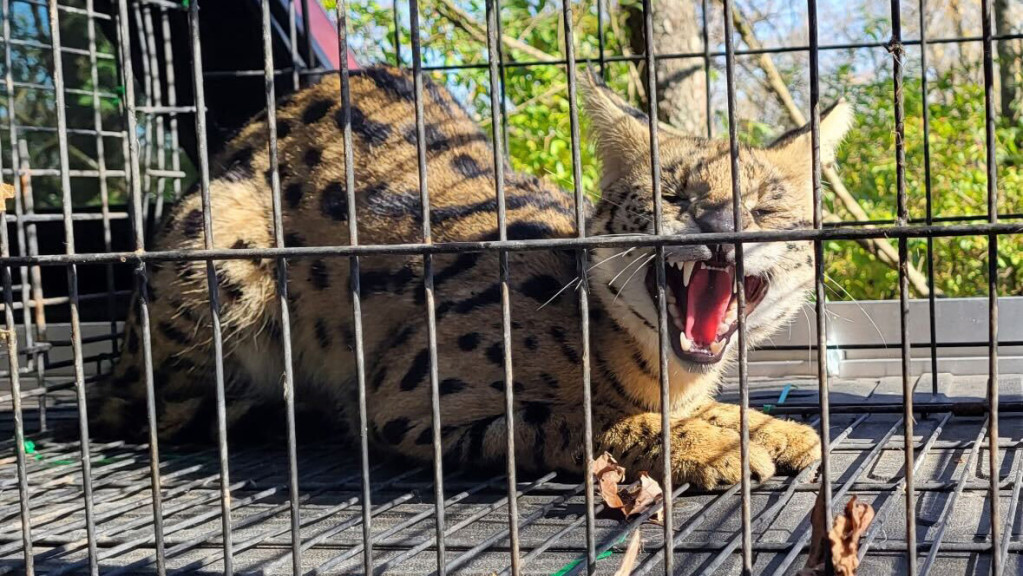Wild animal pet trend prompts legislation banning servals, kangaroos and other animals in Illinois

A serval escaped in Decatur last fall and was on the loose for about two months before the cat was captured and sent to animal control, according to Ronald Atkins, administrator for Macon County Animal Control. Courtesy of Macon County Animal Control
Two incidents of wild cats on the loose in Illinois in the past year have prompted lawmakers to take action.
Servals are a wild cat species native to Africa. Last fall, a serval cat escaped from the possession of a man in Decatur, and it took roughly two months before the cat was captured and sent to animal control.
Shortly after that incident, in Vernon Hills, a serval cat escaped and “spent the afternoon terrorizing the neighborhood,” said State Rep. Daniel Didech (D-59), who has since introduced a bill that would ban servals, among other wild animals, in Illinois.
“I think more and more people are starting to buy these animals because they’re trendy and new and they're beautiful animals,” Didech said. “But the reality is: they're wild, dangerous, non-domesticated animals that really aren't appropriate to have in a residential neighborhood.”
The new measure would ban the ownership of exotic animals including servals, caracals, kangaroos and wallabies along with any hybrid of these animals. This bill is an amendment to the 2012 criminal code act which includes a section that makes it illegal to own certain animals.
Growing interest in these pets, fueled in part by social media, has some who work in animal control concerned, including Ronald Atkins, the administrator for Macon County Animal Control.
“A serval is a wild animal, regardless of how they may be portrayed by some people and how some of them may behave in some circumstances. They're still a wild animal,” Atkins said.
The issue is not unique to Illinois, Didech said.
“About half the states in the country now ban ownership of serval cats,” he said. “The reality is more and more people are trying to buy these animals, and it's something we have to be responsive to.”
Didech said the proposed addition of several wild animals to the state’s list of banned animals was prompted by problems seen in other parts of the country.
“We included those additional animals [wallabies, caracals, kangaroos] at the suggestion of the Humane Society,” Didech said. “Much like servals, these are animals that are not to be domesticated and not appropriate to be kept in a residential environment.”
If this bill becomes law, hybrids of these wild animals would also become illegal, including savannah cats, which are a hybrid of a domestic cat and a serval. But people who currently own hybrids would be able to keep them, Didech said, since savannah cats tend to be less aggressive and have the temperament of a house cat.
“Savannah cats aren't a class of animals that are generally in imminent danger to the community,” he said. “Going forward, we can't have the dynamics that incentivize people to bring in serval cats to breed more savannah cats.”
Exceptions to the bill include federally licensed facilities, veterinary hospitals, and for the use by motion picture companies as long as the animal is in the control of a handler.
Atkins said that there are currently no laws preventing people in Illinois from owning a serval cat, however there is an ordinance in Decatur that prevents people from owning wild animals.
Legislation that is more spelled out could make the rules regarding wild animals easier to understand, Atkins said. This can be especially helpful because different cities have different ordinances pertaining to wild animal ownership.
“I do find that it makes our job easier when there's clearly defined statutes,” he said. “It's illegal to sell them but not necessarily illegal to possess them…. It makes life easier when things are clear cut.”
Some Republican lawmakers, including Tony McCombie (R-89), have criticized the bill, saying it’s unnecessary and that lawmakers should be prioritizing other bills. Didech said that this bill holds importance and can still exist while other legislation is created.
“We're able to do a lot of things at the same time. We passed hundreds of bills out of the House of Representatives…,” Didech said. “The reality is this was one of a lot of bills that we passed that touch on a lot of different issues, and we're able to walk and chew gum at the same time.”
The bill passed the Illinois House in April and was re-referred to assignments after the first Senate reading.

